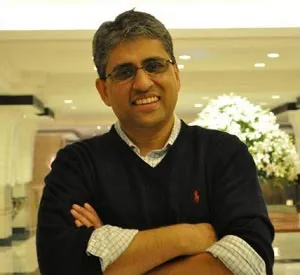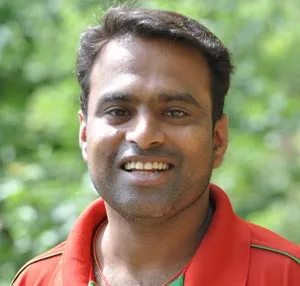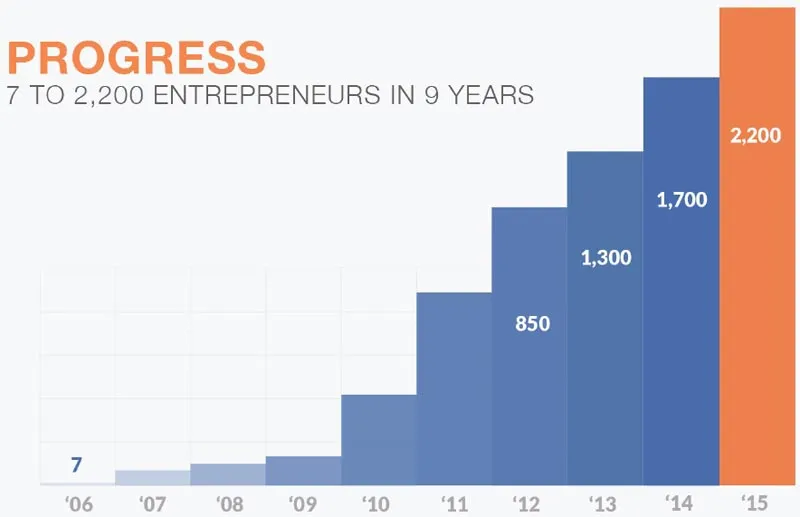‘We will help founders build their startups and chase their dreams’ - Anupendra Sharma, Co-founder, Startup Leadership Programme
[This article is part of the YourStory series Startup Hatch, about incubators, accelerators and makerspaces in the startup ecosystem. See earlier profiles of initiatives at IIT Bombay, IIM Bangalore, BITS Pilani, NCL, Tata Elxsi, Axilor, NID, IIIT-Bangalore, IIIT-Hyderabad, Vellore Institute of Technology, PSG Coimbatore, Workbench Projects, Makers Asylum, Appy Hours, Turning Ideas and Ashoka Innovators.]
The Startup Leadership Programme (SLP) is a highly selective, world-class training programme for outstanding founders, leaders, and innovators. SLP Fellows have founded nearly 1,600 successful startups and raised more than $500 million in funding. The 2016-2017 programme is now open for admissions.

SLP has chapters in seven cities in the US, six in India, four in Europe, two in Australia, and five elsewhere in Asia. SLP Co-founder Anupendra Sharma is also Senior Investment Partner at Siemens Venture Capital, and serves on the Board of USARAD and Seventh Sense. He has an MBA from Cornell and Bachelors of Instrumentation Engineering from BITS Pilani.
Anupendra - along with Prashant Pansare who is their India director - joins us in this interview with updates on the journey, accomplishments and messages of this unique programme (see earlier YourStory profile here).
YS: What was the founding vision of the Startup Leadership Programme?
[Anupendra]: We will help founders build their startups and chase their dreams. In return, we want founders, irrespective of their success, to help those who cannot help themselves by giving wealth, knowledge, or resources. We want to build the world’s best entrepreneurship education programme and global network of high-caliber entrepreneurs.
I co-founded SLP along with Puran Dang in Boston in 2006. We started in India with the help of Alok Mittal.
YS: What is the range of your activities in Indian cities?
[Prashant] There are six chapters in India – in Bengaluru, Delhi, Hyderabad, Pune, Chennai, and Mumbai. In all chapters, we select about 20-30 entrepreneurs each year to undergo our six-month long programme. Each chapter is autonomously and independently run along the set guidelines for structure. The programme has about 10-12 full-day sessions on Saturdays, which are mentored by entrepreneurs from startups with hands on-learning and interaction.
YS: What would you say are the top three opportunities for Indian startups?
[Prashant] The top three opportunities would be rise of the startup ecosystem over the last few years, excellent mentors who have built startups ground-up and can guide founders in the right direction, and a diverse market. Across the globe, we have very few markets which are as diverse from customer perspective as well sector and adoption perspective. That is where India offers great opportunity for many upcoming entrepreneurs to launch and test and fail fast.
YS: What do you see as the key challenges faced by startups in India, and how can you help bridge the gap?
[Prashant] Over the years, the industry has seen a tremendous support system evolve around startups. There are many early mentorship programmes, accelerators and so on that have mushroomed in the last few years. But none of them work on zero equity and an excellent structure with life-time global peer support group - that is what SLP does.
Three key aspects that SLP ensures are: diverse founders across domains (sector and startup stage agnostic); hands-on founders as mentors; and peer learnings and engagement beyond the programme with lifetime global network engagement.
In our sessions, we ensure that we get mentors who have hands-on execution experience of startups themselves, or investment experience. As successful founders, we have the likes of Ankur Singla of Helpchat, K. Harishankaran of Interviewstreet, Ritesh Dwivedi of Justeat, Sampad Swain of Instamojo, and Shivakumar Ganesan of Exotel. This makes the sessions a very interactive learning experience for new founders.

YS: What are the selection criteria for startups in your programme?
[Anupendra] We look for the following in people: passion, leadership ability, domain knowledge in one field, ability to execute, high caliber and community builders.
[Prashant] We try our level best to ensure that the selected 25 odd founders have a great mix of diversity, startup stages and domains so that peer learning is at best. The programme is also open to angel investors and VCs in addition to entrepreneurs.
YS: What support and services do startups receive in your programme?
[Anupendra] We provide highly technical education of the lifecycle of a startup. Mentors, speakers and other professionals as jurors come to the classes. There is also peer-to-peer learning from a high-caliber group of 30 people and beyond via various founder meetups.
Online, we have Google Hangouts with others in each sector around the world. We also cover pitch deck training, demo days, and the F6s gold card (same as TechStars and other Tier 1 organisations).
We do not give money, but we give an education programme, global network, and access to funding through demo days for life.
YS: Do you take equity from startups? What is your skin in the game?
[Anupendra] No, we take zero equity. But we charge them Rs 15,000 to take care of operational expenses such as food, beverages, parties, and gifts for mentors. Our skin in the game is the founders global network which will have significant impact in creating great value in society.
YS: How would you differentiate from other networks in this space, such as TiE and The Entrepreneurs Network?
[Anupendra] We create trusted cohorts that work in groups and are on a six-month journey together. They are joined to a global alumni network. Thus, it draws more parallels to a university, like an MBA for an entrepreneur combined with on-the job training since we work on their startups.
YS: What would you define as success for your programme?
[Anupendra] Graduation, raising money, and an exit – and also help others who need more help. Startups who have graduated from our programme include Ixigo, Greyorange Robotics, Mindtickle, Grabhouse, Azoi, SchoolAdmissions, SourceEasy, Lookup, Helpchat, Furlenco, Locus, PratiLipi, and many more (see our website for a full list of startups by sector, stage and city).
YS: What programmes have been launched in other parts of the world? How would these different city chapters offer synergies to local startups?
[Prashant] SLP operates in 26 different chapters across 12 countries on a similar structure. They collaborate through meetups, global hangouts, and travel to other cities. Many SLP fellows from India come to the US, for example. A founder can attend any class in any city.
YS: What are your plans for the coming three to five years with respect to new startups?
[Anupendra] We will do more to raise the profile of our startups, and more structured work on customer development. More of our fellows will become mentors; we will get them more deeply involved in advisory roles and investing in startups. We also want Indian startups in SLP to have a global mindset.

YS: What are your recommendations for Indian policymakers to boost entrepreneurship?
- Tax breaks for angel investors who invest in startups (let them write it off).
- Like Israel, we should leverage risky dollars: for every dollar into certain industries, give up to $5.
- Very high speed internet.
- Widespread entrepreneurship education.
[Prashant] The spirit of entrepreneurship should be cultivated from college education, and more programmes and support systems are required to support these entrepreneurs so that they become skilled than degree focused.
YS: What are your parting words of advice to the startups and entrepreneurs in our audience?
[Prashant] We as entrepreneurs should also focus on creating value through our venture, and contribute to uplift society to a better level than what it is.









![[YS Exclusive] Anand Chandrasekaran, 9unicorns, Inventus lead $3.5M round in AR social networking app Flam](https://images.yourstory.com/cs/2/77e43870d62911eaa8e9879653a67226/Imagek1m3-1627448072457.jpg?mode=crop&crop=faces&ar=1%3A1&format=auto&w=3840&q=75)

